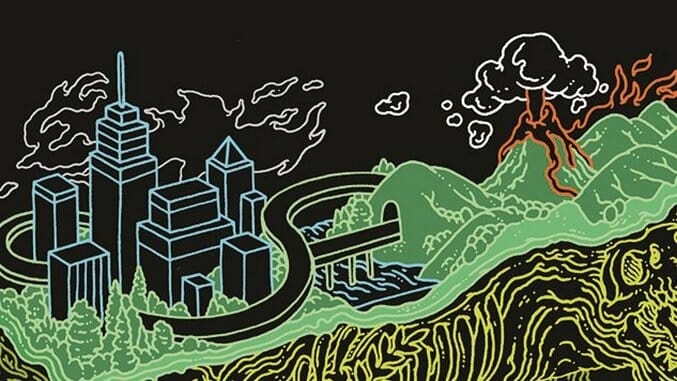Introducing Endless Mode: A New Games & Anime Site from Paste
What does it take to kill the world? This is the main question environmental journalist Peter Brannen investigates in his new book, The Ends of the World: Volcanic Apocalypses, Lethal Oceans, and Our Quest to Understand Earth’s Past Mass Extinctions. As Brannen explains, life on earth has been almost extinguished five times over the course of our planet’s history, and he posits that the past can grant us a clearer understanding of our present situation.
The signs that humanity is flirting with its own extinction seem clear, whether our politicians admit it or not. So if you’re wondering how bad it can get, Brannen argues that “the history of mass extinctions provides the answer.” And given the Trump administration’s decision to quit the Paris Climate Agreement and drastically reduce the Environmental Protection Agency’s regulatory power—well, this book is timely to say the least.
 To be sure, historical lessons are always hard to parse. There often are conflicting theories as to why events unfolded as they did; even when similarities to our own time appears in the historical record, their explanatory power isn’t always clear. This is not lost on Brannen, as he explains in his chapter on the first mass extinction, the End-Ordovician, which took place about 445 million years ago:
To be sure, historical lessons are always hard to parse. There often are conflicting theories as to why events unfolded as they did; even when similarities to our own time appears in the historical record, their explanatory power isn’t always clear. This is not lost on Brannen, as he explains in his chapter on the first mass extinction, the End-Ordovician, which took place about 445 million years ago:
Certain features of the hoary Ordovician extinction lend themselves to modern comparisons—the role of carbon dioxide-driven climate change and habitat destruction, for instance. But there are certain aspects of the ancient extinction that strain any analogy to our modern world.
One of the book’s most persistent themes is that foreignness of these bygone Earths seems nearly absolute. When it comes to paleontology, thinking in such vast swaths of time borders on the incomprehensible. A period 445 million years ago is about as easy to comprehend as having 445 million dollars in your bank account. What does such a quantity even mean?
Brannen borrows from the Carnegie Institution’s Robert Hazen’s brilliant solution that resolves this deadlock: think in terms of walking. “[I]magine each step you take represents 100 years of history. The simple conceit has stupefying implications.” He’s not wrong. Take 20 steps back, and you pass Jesus giving The Sermon on the Mount. “[K]eep walking for 20 miles a day, every day, for four years” and you’ll “cover the rest of planet earth’s history.” Brannen’s succeeds in making concepts like these (in addition to the technical jargon) comprehensible to the lay reader. And making it easier to understand makes it easier for us to appreciate what Brannen’s walking tour of mass death has to offer us. Which is plenty.
There are two main takeaways. The first is that despite the unrecognizability of these previous earths—one where armor-plated sea-beasts glutted themselves on smaller fish and died vomiting, or where creatures so dull they could barely be recognized as alive roamed the planet at will, or where the Hollywood-famous velociraptor had its own era of dominion—each is inscribed into our history and coded somewhere in contemporary species. Consider the aforementioned Ordovician extinction, which littered Virginia and Ohio with fossils. Harrisonburg, Virginia has “caves in the area [that] are carved out of limestone made by ancient sea life, and they’re filled with graffiti left by Confederate troops hiding from the Union army.” Our planet and its deep history are intimately linked with our current moment. All this death is with us. And this should give us pause.
Brannen’s second takeaway is that this should give us pause, because humans have been especially lucky. Earth has supported life for hundreds of millions of years, yet “no animal in the history of the planet […] has ever found itself at so consequential a crossroads as ourselves.” Human life, like all life, is fragile. And we’ve come to a place where the next hundred years will make or break our survival. As cosmologist Anthony Aguirre tells Brannen, “If we’re kind of the only one in the galaxy […] that’s a huge future that we’ve extinguished. And it’s all just because we’re being stupid now.”
Brannen is right to point out that “as a species, we seem so ill-equipped for what lies ahead.” But with grace and wit, he also makes a compelling case that recognizing our fortune and coming to terms with our fragility means consciousness prevails in the universe. We are still capable of changing the way we live.
Emmet Martin Penney is a poet and essayist. His writing has previously appeared in Paste Magazine, Hollow, Madcap Review and The Bad Version. He also runs the blog Museum of the Half-Forgotten, and you can find him on Twitter.

 To be sure, historical lessons are always hard to parse. There often are conflicting theories as to why events unfolded as they did; even when similarities to our own time appears in the historical record, their explanatory power isn’t always clear. This is not lost on Brannen, as he explains in his chapter on the first mass extinction, the End-Ordovician, which took place about 445 million years ago:
To be sure, historical lessons are always hard to parse. There often are conflicting theories as to why events unfolded as they did; even when similarities to our own time appears in the historical record, their explanatory power isn’t always clear. This is not lost on Brannen, as he explains in his chapter on the first mass extinction, the End-Ordovician, which took place about 445 million years ago: